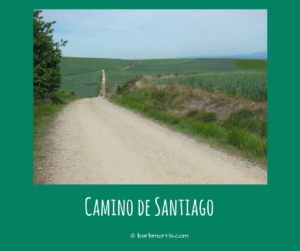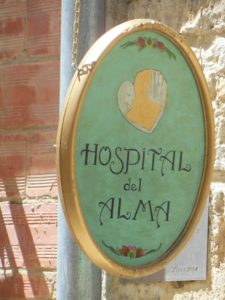 THIS IS A SCENE FROM MY CAMINO NOVEL-IN-PROCESS. PLEASE SEE THE FIRST EXCERPT, “THE MESSIES,” WHICH INTRODUCES THE NOVEL AND WHY I’M POSTING THIS WRITING IN ITS RAW STATE.
THIS IS A SCENE FROM MY CAMINO NOVEL-IN-PROCESS. PLEASE SEE THE FIRST EXCERPT, “THE MESSIES,” WHICH INTRODUCES THE NOVEL AND WHY I’M POSTING THIS WRITING IN ITS RAW STATE.
So here our three travelers are, Hope on the floor and Martha and her mom on a soft couch covered with an Indian throw, safe and warm in the arms of the Hospital of the Soul. Hope is happily eating sugar cookies off of prettily-flowered china and chattering away. She licks her fingers with gusto and relish, licking the sugar and crumbs off, then swiping the crumbs off her plate with her finger. Hope is content, and so is Martha as she watches Hope’s contentment. She’s aware in a corner of her mind how truly bizarre this is – sitting in the warm living room of a house in Spain called the Hospital del Alma with her dead mother and her little daughter who until just a few hours ago was curled up in a chest freezer nestled in her chest, naturally, right beside her heart.
Martha realizes that her heart has been keeping Hope alive all these years, and the Hospital of the Soul is the perfect place for the three of them to be.
I wonder if others can see all three of us, or if I just look crazy and alone from the outside. But I choose to believe the evidence of my senses – here these two are. Hope is eating cookies. My mom is next to me, drinking chamomile tea with honey. I feel warmth from the wood stove. I can see and hear María outside building a mosaic in the patio’s east wall. A pine tree I don’t know the name of overhangs the glass ceiling of this room.
I am simply grateful to be here.
I love this space. I love the earthiness and the colors and the constant surprise. I love the hospitality of it – not a Parker House hospitality, but a hospitality of the heart and home. This is a place on the Camino designed for one purpose only – refuge for peregrinas’ souls. A Hospital of the Soul. I love the complete lack of expectations and judgment. “Come in and sit.” That’s all. Warmth, nourishment, comfort, welcome. All it needs is cats.
And at that moment Martha see kittens in the back, on the patio, and the place is complete. She could sit here forever.
This magical child who’s evidently not an apparition will need some clothes. Are those rubber-toed red sneakers adequate to the task of walking at least a little every day? They’re from a time when support in kids’ shoes was nonexistent. Martha hears herself worrying about Hope’s shoes, because she has no idea what she’s going to say to Maria at dinner when she asks for their story.
Here’s all she knows: she retired from her teaching job, a job she loved for many years and was good at, because it was time. Class sizes were growing, the kids were getting harder to reach, and she had less time and creativity because of mandated curriculum and tests every other week, it seemed. So it was time. She would have done a few more years, but then the district sweetened the retirement deal for older teachers and she jumped ship.
My kids didn’t need me, I’d seen The Way and done a little research, and I knew I needed a Thing to Do right after retirement. An intentional journey wanted to happen and the Camino met that need – cheap, flexible, set up for solitary walkers. A week after I turned in my school keys I was on a plane to Madrid, then a train to León, a bus to Pamplona, and another bus to SJPP*.
Everything had been pretty normal for the context of doing this crazy thing of walking 500 miles to Santiago, for the first week or so. Little stuff had started happening around then. She’d found herself taking unplanned side excursions and detours, sitting by the side of the track for a few hours, walking by herself a lot. These things just seemed to happen. But once on the Meseta, they’d come fast and furious, getting odder and odder all the time. The voice in the Templar church. The cougar who talked. The jar of messies. She was beginning to get used to it. Retrieving her daughter from a freezer in her chest and having her mom come along to help thaw her out was only the latest. It was also, she knew, of a completely different order of magnitude of crazy. These two seemed to be real people. Her mom she could explain, sort of. This little girl dressed in clothes from the 1960s, not so much. What will they tell Maria, she wondered.
Just then Hope got up, wiped her hands on her 1960s trousers, and climbed into Martha’s lap. She put her arms around her mom’s neck, said in a muffled voice, “Thank you for unfreezing me,” and fell asleep. Martha glanced at her mom and found her mom looking at her. They shook their heads, smiled, and returned to silent fire-watching. El Hospital del Alma, indeed.
Eventually they heard the back door opening and María making noise in the kitchen. “I’ll go see what I can do,” said her mom. She heard her mom ask in Spanish how she could help. María evidently found her something to do, since the next sound she heard was voices and occasional laughter. The sounds of wine glasses being filled, along with cooking noises and smells, came from the kitchen. Her mom came to her with a glass of Riojan wine.
Martha reached out a hand to take it, saying, “Mom, I’m so glad you’re here with me. I don’t understand it, but I’m glad. I think I might be crazy.”
“You’re not crazy, sweetie. You’re wondering how long I’ll be here, right?”
“Thanks, Mom. Of course I am. And I’m also trying to just be here now and enjoy this gift. Since I’m not crazy.”
Her mom smiled and returned to the kitchen. Martha sat, a daughter she didn’t have this morning on her lap, and drank her wine. I’ll take it, she thought. I’ll take it. I won’t get to keep it, I sure as hell don’t understand it, but I’ll take it. I’ll enjoy every minute I get with these two, and I won’t mourn them before they’re gone.
Supper starts with a salad of baby greens and peas, because it’s June in Spain and Maria’s garden has just started producing. The flowers and tomatoes will come later, in a month or so. Chicken and rice, and quejada for dessert. Hope has been pulled up to the table on a stool, and she’s digging into her chicken, cut up for her by María, and her rice. She eats the peas with her fingers, eschewing the lettuce. It’s her first real meal in decades – she’s been kept alive by Martha’s heart but she’s hungry for real food.
This meal is delicious. “Gracias, María. Es delicioso,” Martha says. María responds, “Y gracias para ustedes. I am happy you are here.” Hope keeps shoveling it in, humming happily. Then she looks up and says to Maria, “I’ve been frozen next to my mommy’s heart for a long time. Today she found me and unfroze me, and here I am!”
Her mom added, “And I was walking along and saw Martie sitting on a rock in a field of poppies, this one on her lap, and I thought they might need help so I went to see what was up. As I got closer I could see that I knew them. Then I saw that they were Martha and Hope, both of whom I was surprised to see. Martie because I’m dead and she’s alive, and Hope because I hadn’t seen her since she was a little girl.”
Okay then, thinks Martha. She won’t be any help explaining this to me, or anyone else. Maybe when you’re dead you just take weird shit for granted.
María simply nodded and took another bite. “There were angels all round you three,” she said. “You were glowing when you entered my house. It’s called El Hospital del Alma for a reason.”
*SJPP is Camino shorthand for St. Jean Pied de Port, a small, charming Basque French town that’s served as the Camino gateway over the Pyrenees into Spain for a millennia or more.

